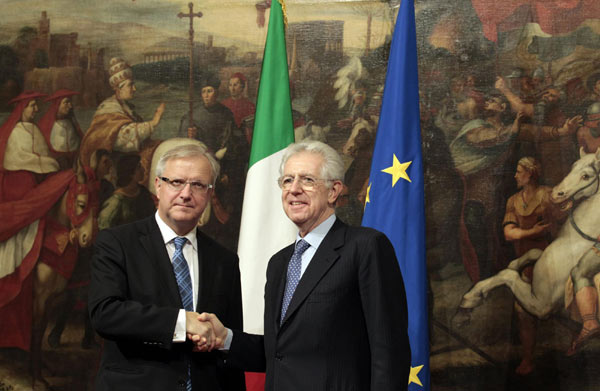Bond market hammers Italy
Updated: 2011-11-26 09:16
(Agencies)
|
|||||||||
 |
|
European Union Economic and Monetary Affairs Commissioner Olli Rehn (L) shakes hands with Italy's Prime Minister Mario Monti during a meeting at the Chigi Palace in Rome, Nov 25, 2011. [Photo/Agencies] |
ROME/MADRID - Italy's borrowing costs soared to their highest levels since Rome joined the euro on Friday, piling pressure on the newly installed government of Mario Monti at the end of a week in which the euro zone crisis tainted even safe haven Germany.
A punishing bond sale, in which Italy was forced to pay a record 6.5 percent for six months paper, came after a disastrous German bond auction earlier in the week and the leaders of France, Germany and Italy failed to make headway in tackling the growing debt crisis.
Amid signs that the euro zone contagion is spreading, indications emerged in Madrid that the People's Party, getting ready to form a government in the coming weeks, may apply for international aid to shore up its finances.
After winning an election this month, the PP under Mariano Rajoy inherits an economy on the verge of recession, a tough 2012 public deficit target, financing costs driven to near unsustainable levels by nervous debt markets and a battered bank sector with billions of euros of troubled assets on its books.
Tuesday's launch by the International Monetary Fund of a credit facility for fiscally responsible countries at risk from the euro zone debt crisis gives it a potential lifeline it may wish to exploit.
"I don't believe the decision has been made ... but it is one of the options on the table, because I've been asked about it. But we need more time and more information on the current state of things," a source close to the PP told Reuters.
Italy's auction on Friday, described by one analyst as "awful", spooked investors further and pushed two-year yields on the secondary market to an eye-watering euro lifetime high of more than 8 percent.
Longer term debt is above a "red line" of 7 percent which forced Portugal, Greece and Ireland into bailouts that Europe could not afford for the much bigger Italian economy.
Spiralling borrowing costs have added to pressure on Monti's government of technocrats, hastily sworn in this month after Prime Minister Silvio Berlusconi was bundled out of office as economic pressures grew.
European Economic and Monetary Affairs Commissioner Olli Rehn threw his backing behind Monti but warned that swift action was needed to contain the escalating euro zone debt crisis.
He dismissed fears that the euro's survival was in question but said the crisis had reached the heart of the single currency.
"This contagion effect has been touching the proximity of the core and even touching the core itself," he told a news conference after meeting Monti in Rome.
"It shows that this is an increasingly systemic phenomenon, which calls for strong financial firewalls in order to contain this contagion and have a counterforce to this market turbulence."










